Campus South, building 20.30 (mathematics), 3rd floor, room 3.060 ("Wellenraum")
Dr. Daniel Friedrich, impulsplus
This two-day on-site workshop takes place on November 21 & 22, 2024.
Content
“Do I have a plan for how to achieve my PhD? How do I define priorities and draw up a schedule? What is required for the process of writing?” A PhD project lasting a number of years will raise many questions requiring individual and tailor-made solutions.
This workshop will help you develop your individual strategy ensuring that your planning will both be effective and efficient in achieving your goal. You will not only learn more about self-management methods, but will also identify and explore external resources such as dealing with the expectations of others and receiving active support from your supervisors.
Registration
Please visit the KCDS intranet portal to register for this course.
For non-members of KCDS:
In order to be able to book the course, a KCDS guest/non-member account is necessary.
If you don't have an account yet, you can register here: Create a KCDS account to book courses
Once your account is activated by a KCDS administrator, you will be able to book the course. The course can be booked by non-members starting October 15.
Picture: Mindspace Studio on Unsplash
Campus South, building 20.30 (mathematics), 3rd floor, room 3.060 ("Wellenraum")
Dr. Daniel Friedrich, impulsplus
This two-day on-site workshop takes place on November 21 & 22, 2024.
Content
“Do I have a plan for how to achieve my PhD? How do I define priorities and draw up a schedule? What is required for the process of writing?” A PhD project lasting a number of years will raise many questions requiring individual and tailor-made solutions.
This workshop will help you develop your individual strategy ensuring that your planning will both be effective and efficient in achieving your goal. You will not only learn more about self-management methods, but will also identify and explore external resources such as dealing with the expectations of others and receiving active support from your supervisors.
Registration
Please visit the KCDS intranet portal to register for this course.
For non-members of KCDS:
In order to be able to book the course, a KCDS guest/non-member account is necessary.
If you don't have an account yet, you can register here: Create a KCDS account to book courses
Once your account is activated by a KCDS administrator, you will be able to book the course. The course can be booked by non-members starting October 15.
Picture: Mindspace Studio on Unsplash
Hybrid: TRIANGEL Studio @Kronenplatz and Zoom
Dr. Nadia Burkart, Dr. Michael Poznic, KIT
Zoom Link
The KIT Graduate School Computational and Data Science (KCDS) at KIT Center MathSEE is excited to invite you to the upcoming KCDS Talk, part of our monthly series covering a broad spectrum of topics from fundamental concepts to current trends in computational and data science.
In November, we are pleased to welcome two distinguished speakers:
Dr. Michael Poznic (Philosophy of Engineering, Technology Assessment & Science, KIT ITAS)
Dr. Nadia Burkart (Applied Explainable AI, Fraunhofer IOSB)
Under the heading "Explainable AI: How Is It Made, and What's at Stake?" the two individual talks will delve into the development and application of explainable AI (XAI) technologies from different perspectives. As AI becomes more integrated into critical sectors like healthcare, finance, and public services, ensuring that AI decisions are understandable to humans has become a growing priority. This session will explore the philosophical and practical dimensions of XAI, shedding light on the ethical, technical, and societal implications of developing transparent and accountable AI systems.
Following the two talks, there will be a discussion with the speakers, offering attendees the opportunity to ask questions and engage in conversation about the topic. The session will be hosted by Lilly Osburg.
Snacks and Drinks & Networking Opportunity: After the event, there will be food provided, offering an excellent opportunity to network with the speakers and other attendees. Make the most of this chance to connect and discuss ideas with fellow researchers and professionals.
Whether you're a master’s student, a doctoral researcher, a senior academic, or simply curious about the field of AI and its impact, this event promises to offer valuable insights.
Join us in person or via Zoom – the event is free and open to all without prior registration.
Online: Zoom
Dr. Lydia Gauerhof, Dr. Alexej Klushyn, Dr. Marvin Teichmann, KIT
Zoom link
The KIT Graduate School Computational and Data Science (KCDS) at KIT Center MathSEE is pleased to invite you to the final KCDS Talk of 2024.
In December, we have an exciting panel featuring experts from various industrial sectors who will discuss "How Different Industrial Sectors Deal with Uncertainty." Uncertainty plays a major role in decision-making, whether it's related to AI models, complex engineering processes, or dynamic systems. Our distinguished speakers will share their insights on how different industries tackle these challenges:
Dr. Marvin Teichmann (Siemens Healthineers - AI & Computer Vision Group)
Dr. Lydia Gauerhof (Airbus - Artificial Intelligence Research)
Dr. Alexej Klushyn (Bosch - Advanced Solutions for Digital Systems)
This talk will highlight the strategies and technologies used by leading companies in healthcare, aviation, and automotive sectors to handle uncertainty in their processes, from AI integration to system reliability.
Following the talk, there will be a discussion with the speakers, offering attendees the opportunity to ask questions and engage in conversation about the topic. The session will be hosted by Dominik W. Wolf.
Whether you're interested in AI applications, industrial innovation, or how companies address uncertainty in complex systems, this talk will offer valuable perspectives from key players in the field.
Join us via Zoom – the event is free and open to all without prior registration.
Campus South (room tbd)
Dr. Carsten Rohr, Soft Skills in Hard Science
This two-day on-site workshop takes place on Januar 13 & 14, 2025.
Content
Publications of research results is the currency in modern science. It might not be your favourite occupation, but it is a decisive one, strongly determining your future research and career opportunities. In this course, you will be introduced to the process of writing a scientific paper. In order to deepen and apply this knowledge, you will also actually produce a manuscript based on your research data (and one that might serve as the foundation for a journal submission). Questions about other forms of text like conference papers can also be discussed.
A-Z of scientific writing
Developing a clear main message
Priority setting in the writing process
Structure and logical flow of the text
Create meaningful graphics
Memorable introduction and abstract
How to develop a daily writing routine
Efficient communication with co-authors
Plus: Writing with AI tools
Please note: Given that this is a hands-on online-workshop, you need some (analysed) data that can serve as the foundation for a journal article. Please also bring some scientific texts written by you (e.g. Bachelor or Master thesis, as well as any published or upcoming papers) to the workshop.
Registration
Please visit the KCDS intranet portal to register for this course.
For non-members of KCDS:
In order to be able to book the course, a KCDS guest/non-member account is necessary.
If you don't have an account yet, you can register here: Create a KCDS account to book courses
Once your account is activated by a KCDS administrator, you will be able to book the course.
Picture by Joanna Kosinska on Unsplash
Campus South (room tbd)
Dr. Carsten Rohr, Soft Skills in Hard Science
This two-day on-site workshop takes place on Januar 13 & 14, 2025.
Content
Publications of research results is the currency in modern science. It might not be your favourite occupation, but it is a decisive one, strongly determining your future research and career opportunities. In this course, you will be introduced to the process of writing a scientific paper. In order to deepen and apply this knowledge, you will also actually produce a manuscript based on your research data (and one that might serve as the foundation for a journal submission). Questions about other forms of text like conference papers can also be discussed.
A-Z of scientific writing
Developing a clear main message
Priority setting in the writing process
Structure and logical flow of the text
Create meaningful graphics
Memorable introduction and abstract
How to develop a daily writing routine
Efficient communication with co-authors
Plus: Writing with AI tools
Please note: Given that this is a hands-on online-workshop, you need some (analysed) data that can serve as the foundation for a journal article. Please also bring some scientific texts written by you (e.g. Bachelor or Master thesis, as well as any published or upcoming papers) to the workshop.
Registration
Please visit the KCDS intranet portal to register for this course.
For non-members of KCDS:
In order to be able to book the course, a KCDS guest/non-member account is necessary.
If you don't have an account yet, you can register here: Create a KCDS account to book courses
Once your account is activated by a KCDS administrator, you will be able to book the course.
Picture by Joanna Kosinska on Unsplash
Hybrid: TRIANGEL Studio @Kronenplatz and Zoom
Prof. André Platzer, Dr. Ö. Sahin Tas, Dr. Ramy Zeineldin, KIT
The KIT Graduate School Computational and Data Science (KCDS) at KIT Center MathSEE is delighted to kick off the new year with an exciting KCDS Talk in January.
The topic for January is "Safe AI: Research Frontiers in Academia" As AI continues to play a growing role in critical sectors such as healthcare, autonomous systems, and intelligent production, ensuring safety and reliability in AI systems has become a major focus for researchers.
We are pleased to host a panel of distinguished academic experts who are leading research in safe AI:
Dr. Ramy Zeineldin (FAU Erlangen-Nürnberg - Department of Artificial Intelligence in Biomedical Engineering)
Dr. Ö. Sahin Tas (FZI - Intelligent Systems & Production Engineering)
Prof. André Platzer (KIT KASTEL - Logic of Autonomous Dynamical Systems)
This talk will dive into the research frontiers in AI safety, exploring how academia is advancing methods to ensure that AI technologies are robust, secure, and trustworthy. From biomedical applications to autonomous systems, these experts will share insights from their latest research and discuss the challenges and opportunities in making AI safer.
Following the talk, there will be a discussion with the speakers, offering attendees the opportunity to ask questions and engage in conversation about the topic. The session will be hosted by Lukas Frank.
Snacks and Drinks & Networking Opportunity: After the event, there will be food provided, offering an excellent opportunity to network with the speakers and other attendees. Make the most of this chance to connect and discuss ideas with fellow researchers and professionals.
Whether you’re a student, researcher, or professional working with AI or simply interested in the future of safe AI, this event promises to be both informative and engaging.
Join us in person or via Zoom – the event is free and open to all without prior registration.
Hybrid: TRIANGEL Studio @Kronenplatz and Zoom
Louise Kluge, Lisa Leimenstoll, Gabriel Mejia Ruiz, Lilly Osburg, KIT
The KIT Graduate School Computational and Data Science (KCDS) at KIT Center MathSEE is excited to present a special edition of the KCDS Talks in February, where KCDS Fellows will showcase their cutting-edge research. This event offers a glimpse into the innovative work being done by the next generation of computational and data scientists.
Join us to hear from four talented fellows as they present their fascinating research topics:
Gabriel Mejia Ruiz (KIT SCC)
"Trainability of Data-Driven Quantum Models"
Gabriel will explore the challenges and possibilities of training quantum models using data-driven approaches and discuss their implications for of quantum computing.
Louise Kluge (KIT SCC)
"Efficient Bayesian Inference in Cosmological Simulations: A Challenge in Uncertainty Quantification"
Louise will delve into how Bayesian inference can be applied to large-scale cosmological simulations, particularly focusing on methods to address uncertainty quantification.
Lisa Leimenstoll (KIT STAT)
"Causality in Extremes: Exploring the General Case of Different Tails"
Lisa will present her research on extreme value theory, particularly focusing on estimating causal relationships in extreme events.
Lilly Osburg (KIT SCC)
"Exploitation of Humanities Data for Big Data Analysis"
Lilly will explore how data from the humanities can be exploited for large-scale analysis using big data techniques, shedding light on interdisciplinary research opportunities.
Following the talk, there will be a discussion with the speakers, offering attendees the opportunity to ask questions and engage in conversation about the topic. The session will be hosted by Lilly Osburg and Lukas Frank.
Snacks and Drinks & Networking Opportunity: After the event, there will be food provided, offering an excellent opportunity to network with the speakers and other attendees. Make the most of this chance to connect and discuss ideas with fellow researchers and professionals.
Whether you're a student, researcher, or simply curious about the latest trends in computational science, this event will provide valuable insights into diverse and impactful research areas.
Join us in person or via Zoom – the event is free and open to all without prior registration.

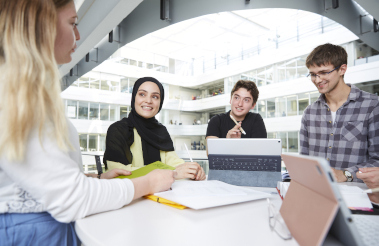

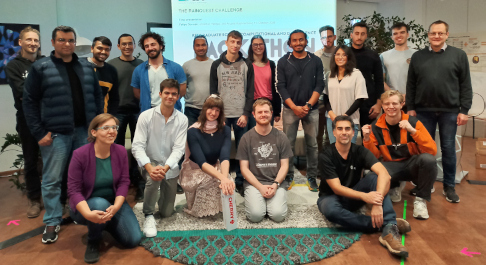
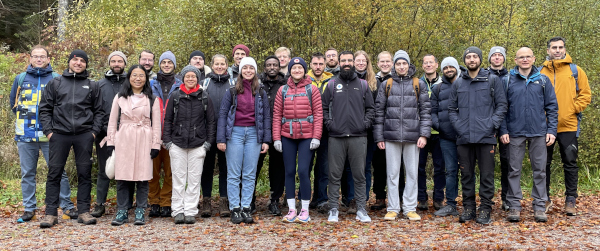
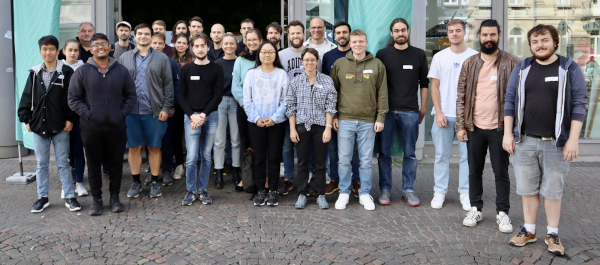
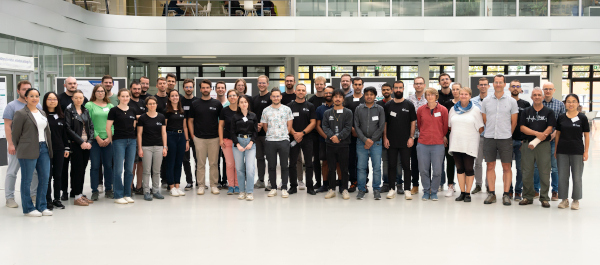

+49 721 608-47748
angela huehnerfuss ∂does-not-exist.kit edu
www.kcds.kit.edu/
